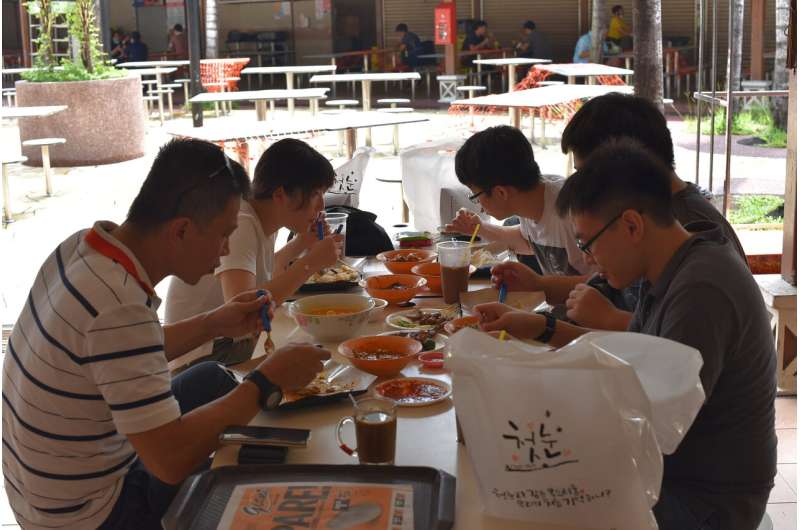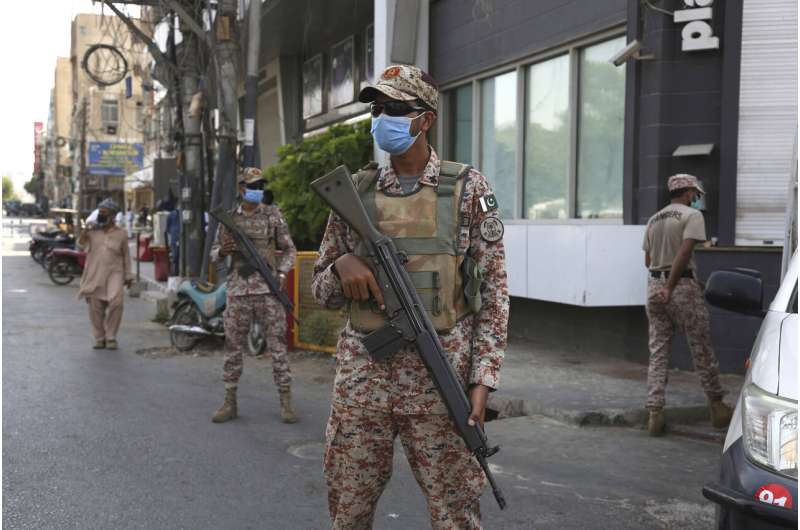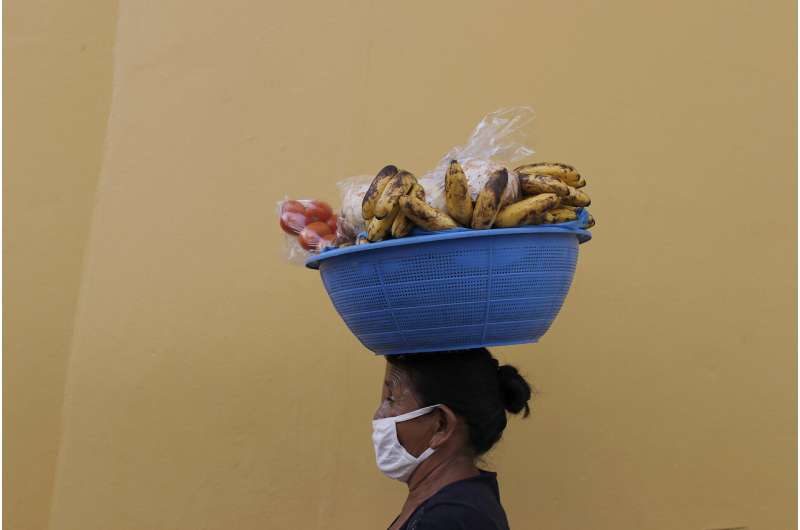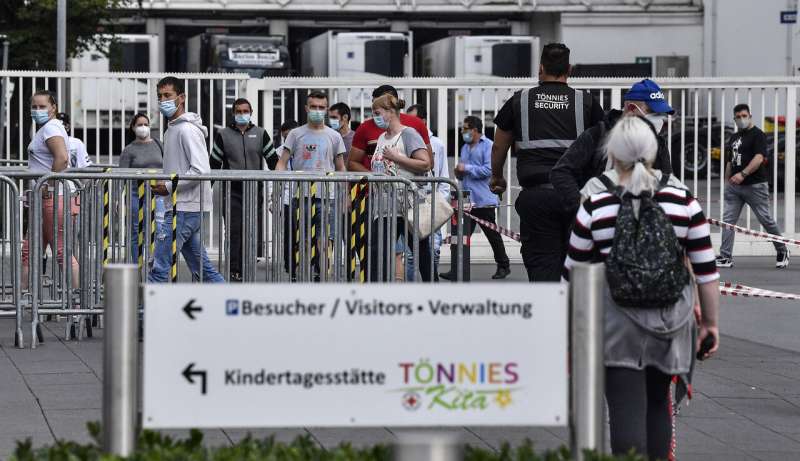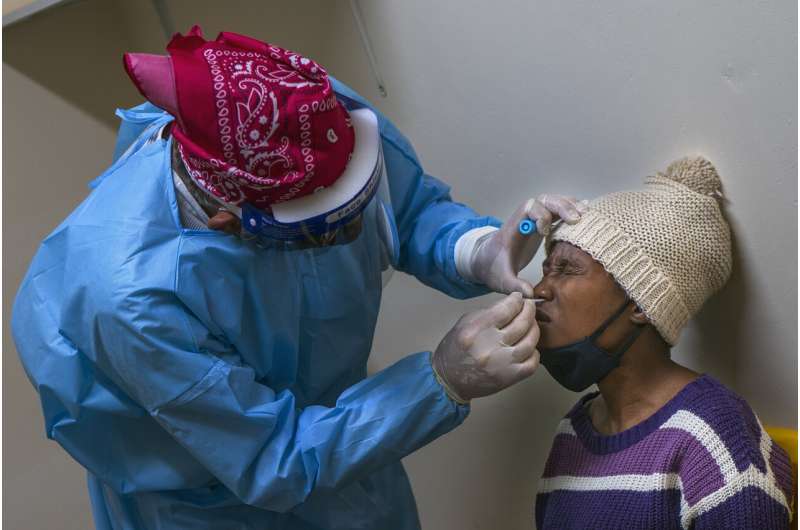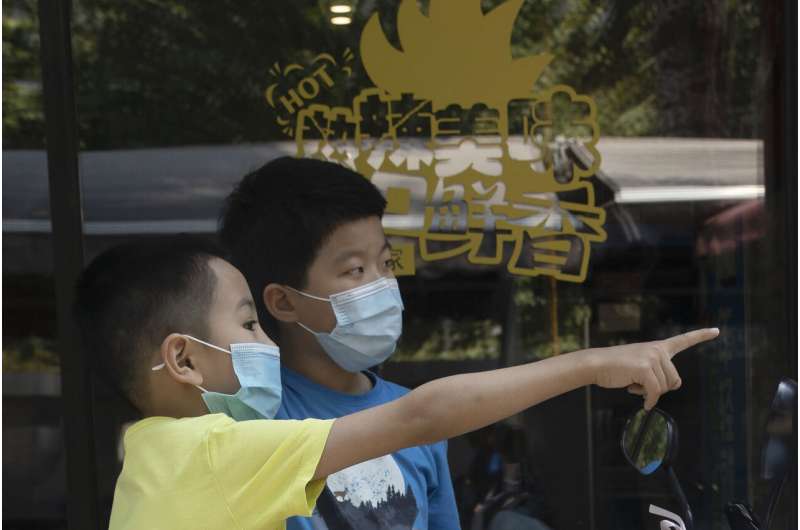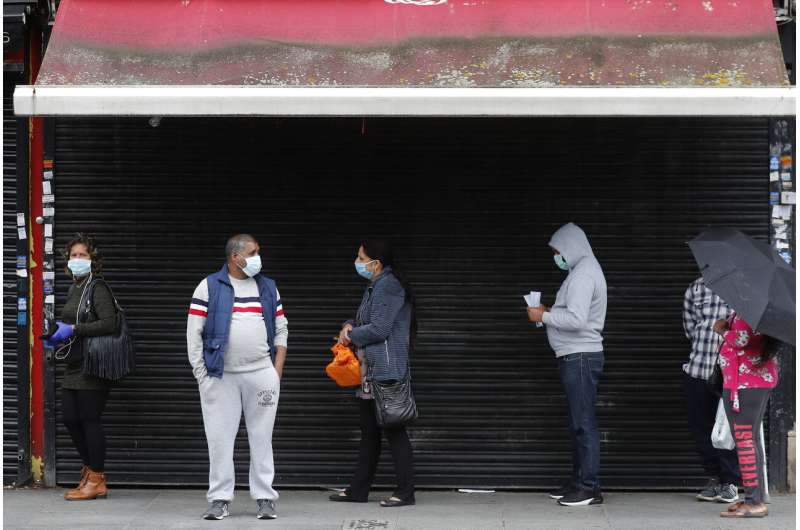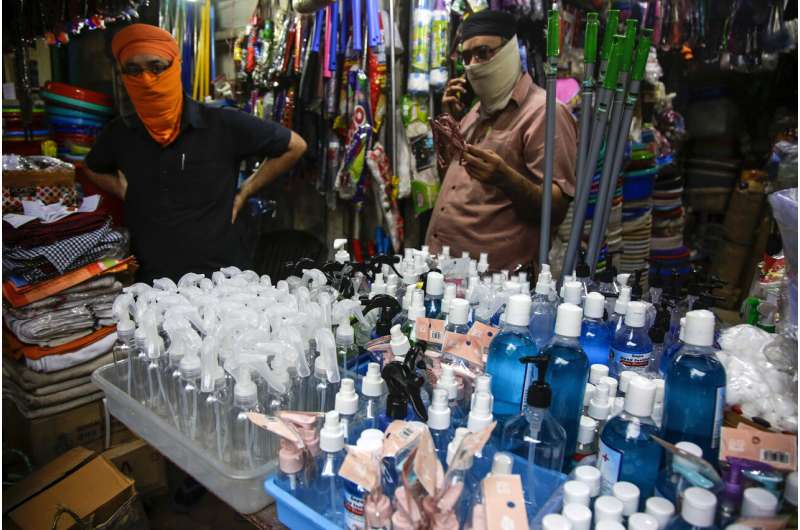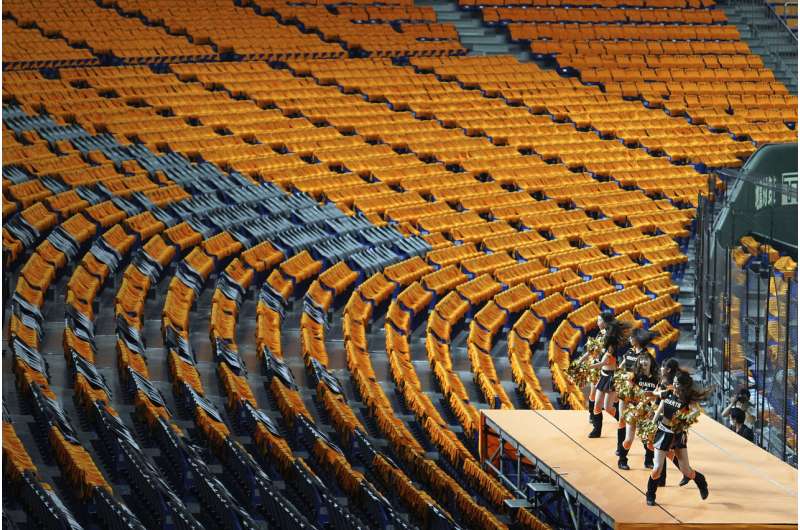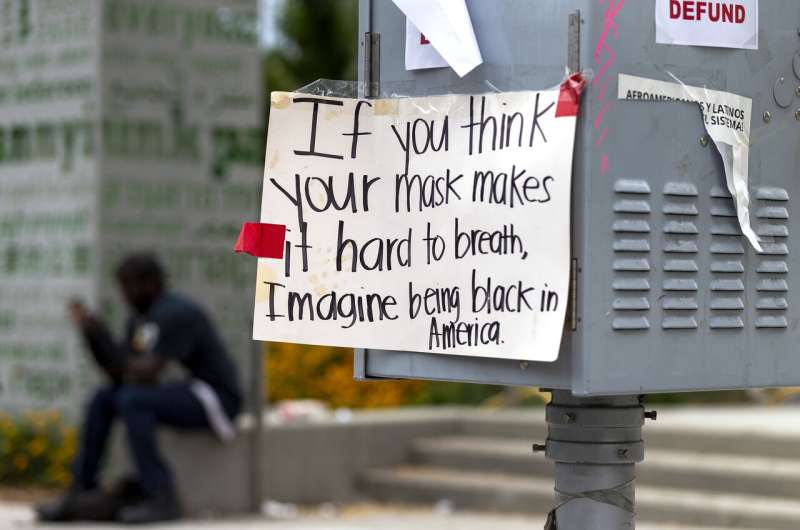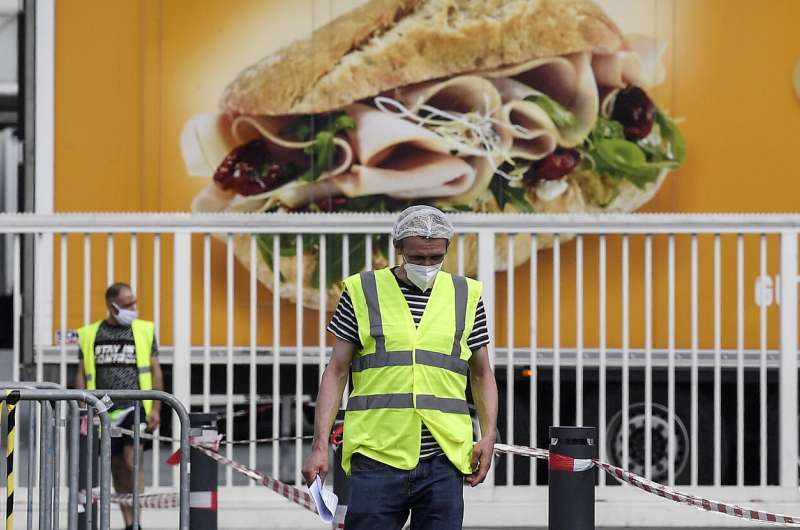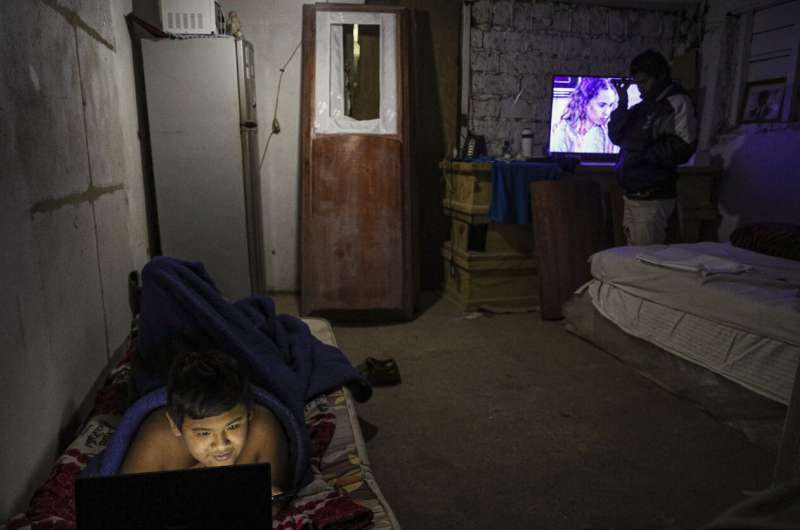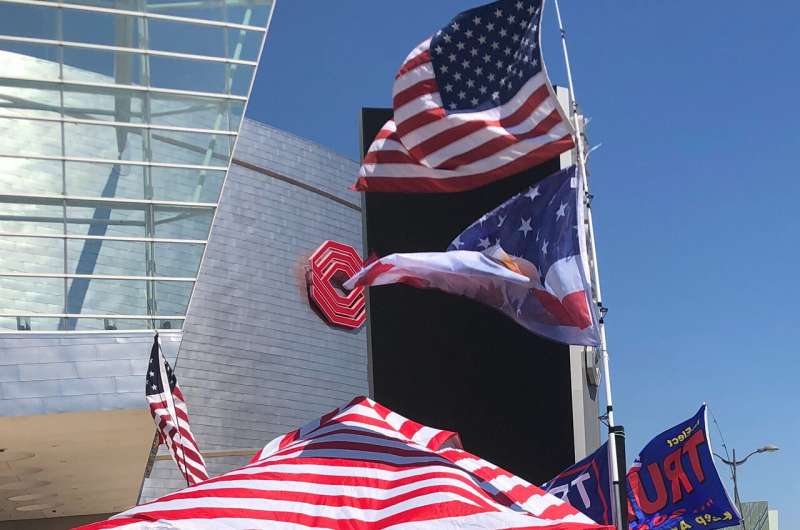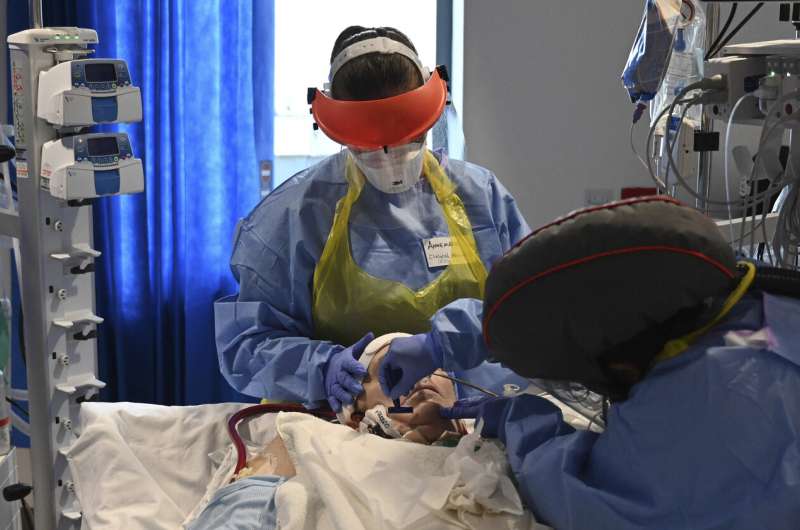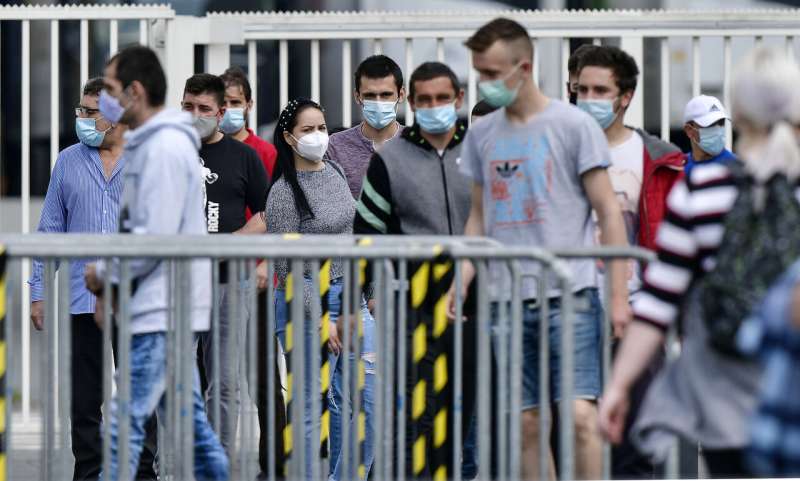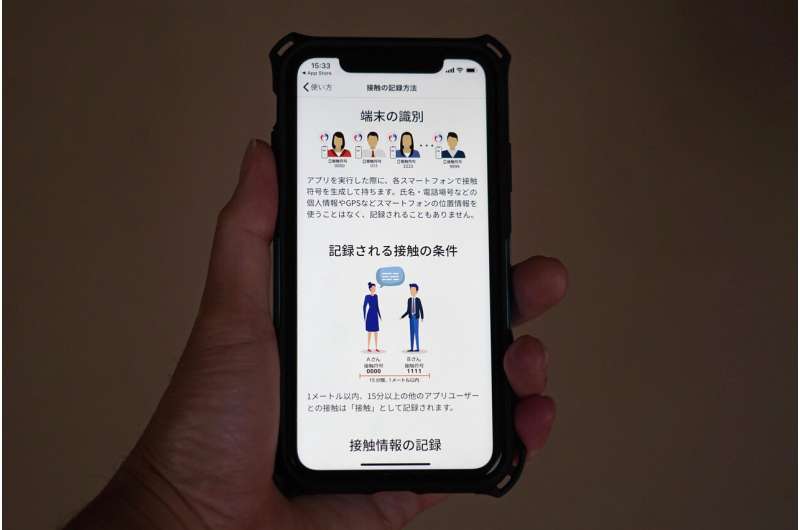A group of five people have lunch together at the Newton Food Center Friday, June 19, 2020, in Singapore. Singaporeans can now wine and dine at restaurants, work out at gyms and get together with five people or less after most lockdown restrictions were lifted Friday. (AP Photo/YK Chan)
Britain lowered its coronavirus threat level one notch Friday, becoming the latest country to claim it's getting a national outbreak under control.
The U.K.'s Joint Biosecurity Center recommended moving the COVID-19 risk in the country from the second-highest level, 4 - meaning transmission is high or rising exponentially - to level 3, where an epidemic is in general circulation.
Health officials say there's been a steady decrease in cases across the U.K. but localized outbreaks are still likely. Britain has Europe's highest pandemic death toll with more than 42,000 virus-related deaths and over 300,000 confirmed cases.
Lowering the alert level was "a big moment for the country, and a real testament to the British people's determination to beat this virus," Health Secretary Matt Hancock said.
Meanwhile, Germany on Friday reported the country's highest daily increase in virus cases in a month after managing to contain its outbreak better than comparable large European nations.
The Robert Koch Institute, Germany's disease control center, listed 770 new confirmed cases, taking the country's total to 188,534.
A flurry of positive tests this week from an outbreak at a slaughterhouse in the western region of Guetersloh contributed the biggest daily increase since May 20.
Soldiers stand alert outside a restricted area that is sealed off to control the spread of the coronavirus, in Karachi, Pakistan, Friday, June 19, 2020. (AP Photo/Fareed Khan)
The German government has stuck to its course of gradually reopening the country while seeking to clamp down swiftly on localized outbreaks..
A free app launched Tuesday to help trace people who may have been exposed to the virus has already been downloaded 9.6 million times in Germany, which has a population of 83 million.
Japan released a similar app Friday, also using technology developed by Apple and Google. Officials say data will only be recorded and stored in individual users' phones and deleted after 14 days to protect their privacy.
"We hope a widespread use of this app will lead to prevention of infections," Japanese Health Minister Katsunobu Kato said.
Singaporeans were able to wine and dine at restaurants, work out at the gym and socialize with up to five people at a time as of Friday, after the city-state removed most of its pandemic lockdown restrictions.
Guillerma Torres, wearing a face mask to curb the spread of the new coronavirus, carries a basket of fruit on her head to sell, on a street in Tegucigalpa, Honduras, Thursday, June 18, 2020. The hospitalization Wednesday of Honduras' president with COVID-19 and pneumonia has drawn attention to another country struggling under the pandemic's strain as cases rise exponentially in the capital. (AP Photo/Elmer Martinez)
"It was a long-awaited experience," said Thomas Tan, a 34-year old customer service officer eating in an outdoor market. "It's good to be able to eat outside with friends but there still must be social distancing."
After at first appearing to have been a model for containing the virus, the country of only 5.8 million has one of the highest infection rates in Asia with 41,473 cases, mostly linked to foreign workers' dorms. Authorities say such cases have declined, with no new large clusters and a stable number of other cases despite a partial economic reopening two weeks ago.
Wee Cheng Yan, a gym trainer, said it felt good to return to work after two months at home.
"Definitely, interaction has been lacking the past few months," he said. "Watching a lot of TV. Doing a bit of resistance band training, which is not as effective as working out in the gym."
Workers with face masks enter the Toennies meatpacking plant, Europe's biggest slaughterhouse, where the German Bundeswehr army helps to build up a test center for coronavirus in Rheda-Wiedenbrueck, Germany, Friday, June 19, 2020. Hundreds of new COVID-19 cases are linked to a large meatpacking plant, officials ordered the closure of the slaughterhouse, as well as isolation and tests for everyone else who had worked at the Toennies site—putting about 7,000 people under quarantine. (AP Photo/Martin Meissner)
The reopening of stores and other public places has been blamed for touching off fresh spikes in infections in a number of countries, raising questions for governments about how to tread the line between keeping economic and social life going while avoiding unnecessary deaths.
China declared a fresh outbreak in Beijing under control after confirming 25 new cases among some 360,000 people tested. That was up by just four from a day earlier.
A Chinese Center for Disease Control and Prevention official said the number of cases was expected to fall soon in outbreak centered on Beijing's main wholesale market. So far Beijing has confirmed 183 new cases over the past week.
The 25 new cases reported Friday in Beijing were among 32 nationwide in China, four of them in Chinese who had returned from overseas.
In this photograph taken Thursday May 21, 2020, Dr. Hugo Tempelman tests a member of the Ndlovu Youth Choir for Covid-19 at a clinic in the Moutse Valley, 160 kms (100 miles) north east of Johannesburg, South Africa. Finalists of the 2019 edition of the U.S. television show America's Got Talent, the coronavirus crisis put the choir's dreams on hold, as their tour got cancelled, and they returned to rural South Africa. (AP Photo/Jerome Delay)
Such outbreaks are inevitable, Wu Zunyou of the Chinese Center for Disease Control and Prevention told a news conference. But he stressed that prevention measures should not slacken.
Beijing suspended classes and put opening-up plans for everything from sports events to art exhibitions on hold. Bus travel to other regions was suspended to prevent the spread of the outbreak.
The pandemic is waxing and waning in many places, with numbers of cases soaring in Indonesia and India, Brazil and Mexico but appearing to be under control or contained in Thailand, Japan, Vietnam and New Zealand.
India recorded 13,586 newly confirmed cases on Friday, raising its total to 380,532. Still, shops, malls, factories and places of worship have been allowed to reopen while schools and cinemas remain shuttered.
Children wearing masks to curb the spread of the new coronavirus chat outside a restaurant in Beijing on Friday, June 19, 2020. China declared a fresh outbreak in Beijing under control after numbers for new cases stabilized as hundreds of thousands are tested. (AP Photo/Ng Han Guan)
Infections surged in rural areas after hundreds of thousands of migrant workers left cities after losing jobs in a lockdown announced in late March. Such precautions are now restricted to high-risk "containment" zones.
In South Korea, outbreaks have inspired second-guessing on whether officials were too quick to ease social distancing guidelines in April after a first wave of infections waned. Officials reported 49 cases of COVID-19 on Friday as the virus continues to spread in the densely populated capital area of Seoul, where half of its 51 million people live. About 30 to 50 new cases have been confirmed per day since late May.
The new coronavirus has infected more than 8.5 million people worldwide and killed more than 454,000, according to figures compiled by Johns Hopkins University. The actual number is thought to be much higher because many cases are asymptomatic or go untested.
Customers queue outside a retail shop in front of a closed shop as coronavirus restrictions on non-essential retailers were lifted in London, Friday, June 19, 2020. Retailers see a much-needed boost in sales this month compared with the record lows in April as lockdown turned thriving high streets into ghost towns. (AP Photo/Frank Augstein)
In the United States, which has reported the most confirmed cases at nearly 2.2 million, states have pushed ahead with emerging from full or partial pandemic shutdowns despite surges in new cases in many places, including Texas, Oklahoma, Florida and California.
New cases skyrocketed Thursday in Oklahoma by 450, double the record-setting number reported two days earlier. Tulsa County, where President Donald Trump plans a rally on Saturday at an indoor arena, remained the state's leading hot spot with 120 new cases for a total of 1,825.
The new wave comes amid demonstrations to protest police killings of black citizens and ahead of weekend Juneteenth celebrations marking the end of slavery in the U.S.
Aid group Doctors without Borders said Friday that at least 10 cases of COVID-19 were confirmed at one of the world's largest refugee camps, the sprawling Dadaab complex in Kenya.
-
Hand sanitizers and empty containers are displayed for sale in Kolkata, India, Friday, June 19, 2020. India is the fourth hardest-hit country by the COVID-19 pandemic in the world after the U.S., Russia and Brazil. (AP Photo/Bikas Das)
-
Cheer leaders perform to empty stands prior an opening baseball game between the Yomiuri Giants and the Hanshin Tigers at Tokyo Dome in Tokyo Friday, June 19, 2020. After a three-month delay caused by the coronavirus pandemic, the world's second-most famous baseball league opened a shortened season Friday without the presence of fans. (AP Photo/Eugene Hoshiko)
-
A sing posted on a street box by "Black Lives Matter" protesters, reads " If you think your mask makes it hard to breath, Imagine being black in America," seen at the Grand Park downtown Los Angeles, Thursday, June 18, 2020. California is now requiring people to wear masks in most indoor settings and outdoors when distancing isn't possible under a new statewide order. California Gov. Gavin Newsom previously allowed local governments to decide whether to mandate masks, and major counties like Los Angeles and San Francisco already require people to wear them inside and outside. (AP Photo/Damian Dovarganes)
-
A worker with a face masks walks in front of a meat truck at the Toennies meatpacking plant, Europe's biggest slaughterhouse, where the German Bundeswehr army helps to build up a test center for coronavirus in Rheda-Wiedenbrueck, Germany, Friday, June 19, 2020. Hundreds of new COVID-19 cases are linked to a large meatpacking plant, officials ordered the closure of the slaughterhouse, as well as isolation and tests for everyone else who had worked at the Toennies site—putting about 7,000 people under quarantine. (AP Photo/Martin Meissner)
-
Cesar Ambrosio, son of Peruvian migrant coffin maker Carmen and Cesar Ambrosio, rests near a coffin used as furniture in his bedroom at the Bergut Funeral Services factory in Santiago, Chile, Thursday, June 18, 2020. Coffin production has had to increase up to 120%, according to Nicolas Bergerie, owner of the factory. His more basic coffin model is called the COVID model and is made to cope with the increase of deaths during the coronavirus pandemic. (AP Photo/Esteban Felix)
-
Supporters of President Trump, including a man dressed as the border wall, line up outside outside an arena in Tulsa, Oklahoma, June 18, 2020, where the president will hold his first campaign rally in months this weekend .Despite the heat, the ever-growing risk of coronavirus and a lukewarm reception from local officials, dozens of backers of Trump are already camped out outside the arena (AP photo/ Tom McCarthy)
-
Members of the clinical staff wearing Personal Protective Equipment PPE care for a patient with coronavirus in the intensive care unit at the Royal Papworth Hospital in Cambridge, England, Tuesday May 5, 2020. (Neil Hall/Pool via AP)
-
Workers with face masks enter the Toennies meatpacking plant, Europe's biggest slaughterhouse, where the German Bundeswehr army helps to build up a test center for coronavirus in Rheda-Wiedenbrueck, Germany, Friday, June 19, 2020. Hundreds of new COVID-19 cases are linked to a large meatpacking plant, officials ordered the closure of the slaughterhouse, as well as isolation and tests for everyone else who had worked at the Toennies site—putting about 7,000 people under quarantine. (AP Photo/Martin Meissner)
-
The smartphone screen, seen in Yokohama, Japan, shows a trial version of the COVID-19 Contact Confirming Application, or COCOA, released Friday, June 19, 2020, by the Ministry of Health, Labor and Welfare. The notice explains how to record the history of the user's contacts. The coronavirus tracing app is designed to alert users if they come in contact with someone tested positive for the coronavirus. Once installed, the app logs data via Bluetooth from phones that stay in close proximity for over 15 minutes. (AP Photo)
Humanitarian organizations have warned that the virus could have devastating impacts on crowded refugee camps, especially as travel restrictions have made the delivery of aid increasingly difficult.
At the Kakuma camp in Kenya, which recorded its first case earlier this month, Congolese refugee Aisha Regina said that if the virus spreads there "then all of us will perish. There is no space where one can stay away from the other."
© 2020 The Associated Press. All rights reserved. This material may not be published, broadcast, rewritten or redistributed without permission.
